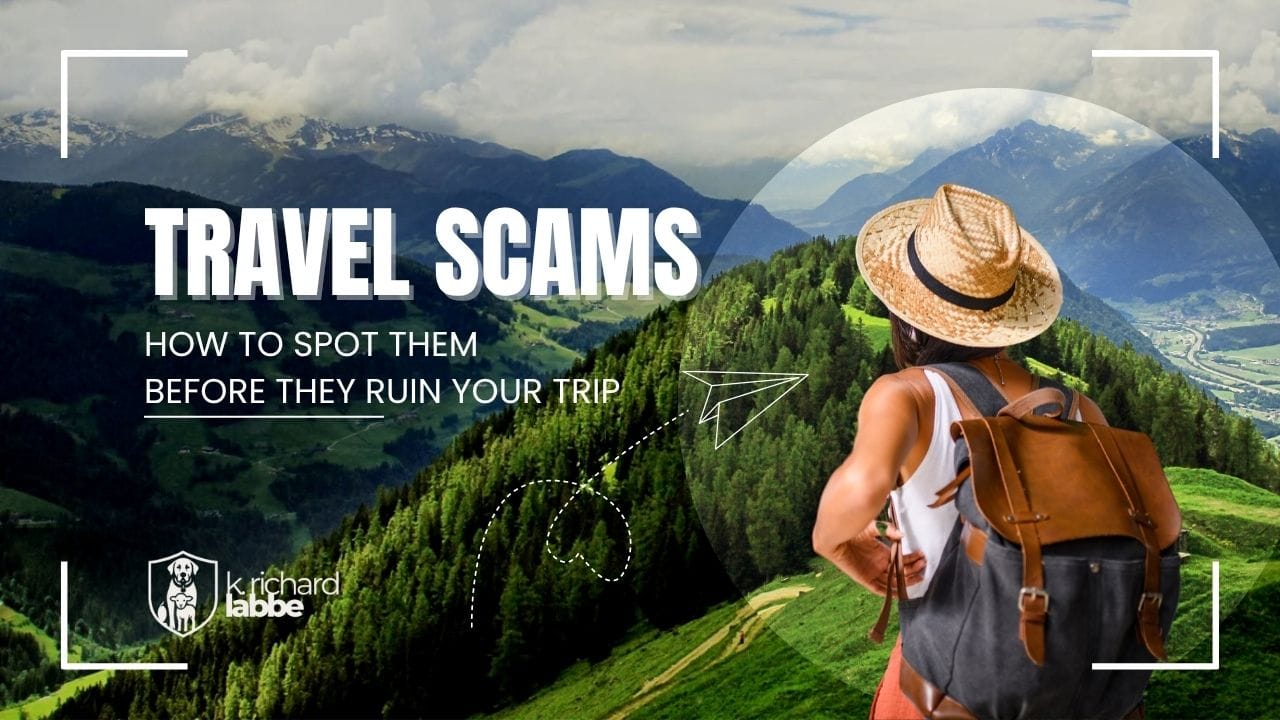Travel Scams: How to Spot Them Before They Ruin Your Trip
Travel scams are more common than ever—especially during summer and holiday seasons. Learn how to spot fake vacation rentals, phony trip deals, and other common travel scams before they cost you time, money, or peace of mind.

Travel scams are on the rise—especially during summer and holiday seasons. From fake vacation rentals to phony “free trip” offers, scammers target travelers looking for deals, relaxation, or adventure. This guide will show you how to avoid common traps and protect your trip, your money, and your peace of mind.
These scams are so common that the Federal Trade Commission (FTC) recently issued updated guidance to help travelers stay safe. We’ve drawn from their insights and added some real-world wisdom to help you travel with confidence—not regret.
Let’s walk through the most common travel scams, how they work, and how to guard yourself and those you love.
The 5 Most Common Travel Scams
1. Fake Vacation Rentals
You find a beautiful beach house or mountain cabin online—at a fraction of the usual cost. You reach out. The “owner” responds quickly but insists on paying outside the app (via Zelle, Venmo, or wire transfer).
You send the money. But when you arrive? The property doesn’t exist. Or it’s not theirs to rent. And the “owner” disappears.
Red flag: Pressure to communicate or pay outside trusted platforms like Airbnb or VRBO.
Do this instead: Always book through the official app or website. Use their messaging and payment tools only. Never send money via peer-to-peer apps or gift cards.
2. “Free” or Deeply Discounted Trips
You get a call or email: “You’ve won a free cruise!” Sounds amazing—until they ask for taxes, fees, or a deposit. Or you find out you’re on the hook for a “presentation” or hidden conditions.
In the end, there’s no trip—or it costs more than a real one would have.
Red flag: “You’ve won!” claims with up-front payments.
Do this instead: Real prizes don’t require payment to claim. Hang up, delete, or verify independently.
3. Impostor Travel Agents
You search for a cheap flight and click an ad or third-party site. You speak with someone who sounds like a real agent. They book your flight, take your credit card info, and email a confirmation.
But when you go to check in? There’s no reservation. And the site is gone.
Red flag: Anyone pushing urgent payment via cash apps, or who contacts you from an unofficial channel.
Do this instead: Always go directly to the travel provider’s official website. Double-check email addresses and URLs carefully.
4. Timeshare Exit Scams
These scammers promise to help you get out of a timeshare or sell one quickly. But they ask for money first—sometimes thousands of dollars. Then they ghost.
Red flag: Upfront fees or high-pressure guarantees.
Do this instead: Check with your resort. Research thoroughly. Don’t pay for timeshare services without a verified track record.
5. Fake Booking Sites or Confirmation Emails
Scammers build fake websites that look like real booking platforms—right down to the logos and design. Others send realistic emails or texts asking you to confirm or change a reservation.
One click… and you’re on a phishing site, handing over passwords or payment details.
Red flag: Spelling errors, odd-looking URLs, or random “confirmation” texts.
Do this instead: Type booking sites directly into your browser. Don’t click unknown links. Confirm reservations using official contact info.
5 Ways to Stay Scam-Smart When You Travel
You don’t need to memorize every scam—just build a few solid habits.
- Slow down before you book.
Scammers love urgency. A good deal can wait while you double-check. - Use a credit card, not Zelle or Venmo.
Credit cards often offer fraud protection if something goes wrong. Read our article about the reasons to favor credit cards here. - Stick to known platforms.
Whether it’s flights, hotels, or rentals—book directly on trusted apps or sites. - Avoid odd payment requests.
Never pay with wire transfers, cryptocurrency, gift cards, or peer-to-peer cash apps. - Print or screenshot your booking—and verify it.
Call the airline, cruise line, or hotel directly to confirm your reservation.
Bonus tip: Consider travel insurance—but only from a reputable company. It won’t prevent scams, but it can protect you from costly cancellations, delays, or medical issues while abroad.
Helping Others Stay Safe, Too
If you’re helping someone else plan a trip—an aging parent, a first-time traveler, a student studying abroad—walk through bookings together. It’s a practical way to build digital confidence and protect them from pressure-based scams.
Even seasoned travelers benefit from a second set of eyes. A five-minute double-check today can save hours of trouble down the line.
What If You’ve Already Been Scammed?
You’re not alone—and you’re not stupid. Scammers do this professionally, and their tactics are designed to override your common sense.
Here’s what to do next:
- Report it to the FTC
- Call your bank or credit card company right away
- Save all communications and receipts
- Tell someone else—you may spare them the same loss
Final Thought: Travel Is Still Worth It
Don’t let scammers steal your sense of adventure. With a little caution and a few wise steps, you can plan a trip that’s full of memories—not messes.
Take your time. Ask questions. And travel light—but travel ready.
Know Someone Planning a Trip?
Send them this post.
Print it for your family’s vacation folder.
Or talk through it over coffee.
We’re not just protecting ourselves—we’re helping others stay safe, too.
Stay safe. Be ready. Online and off.
Every effort has been made to ensure the accuracy and reliability of the information presented in this material. However, Labbe Media, LLC does not assume liability for any errors, omissions, or discrepancies. The content is provided for informational and educational purposes only and should not be considered professional advice. Viewers are encouraged to verify any information before making decisions or taking actions based on it.
